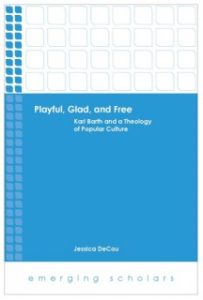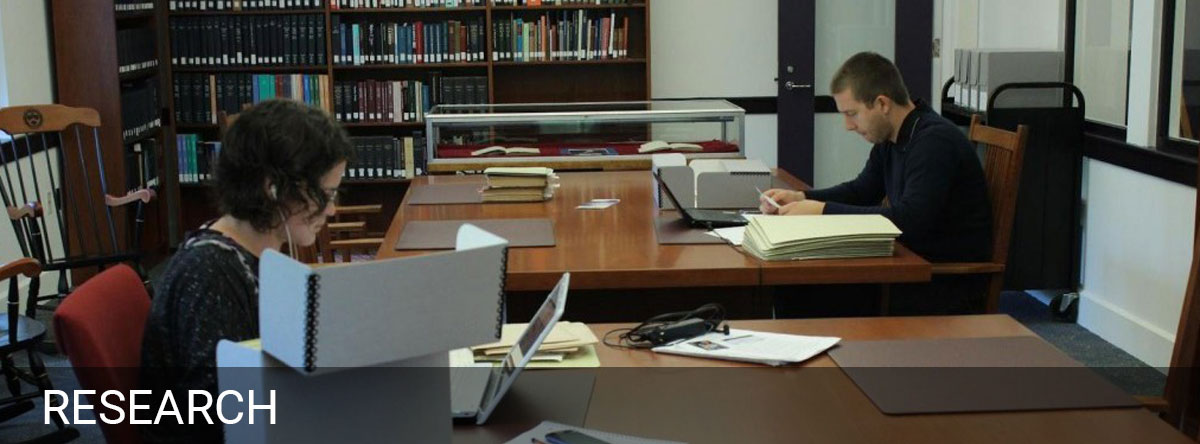 DeCou, Jessica D. Playful, Glad, and Free: Karl Barth and a Theology of Popular Culture (Minneapolis: Fortress Press, 2014), ix + 254pp. $39.00 (paperback)
DeCou, Jessica D. Playful, Glad, and Free: Karl Barth and a Theology of Popular Culture (Minneapolis: Fortress Press, 2014), ix + 254pp. $39.00 (paperback)
Reviewed by Paul L. Metzger (April 29, 2014)
Jessica DeCou claims that this volume is the consequence of “a lifetime of theological interest in popular entertainment and a lifetime of ‘researching’ television” (x). Some might wonder why the author would focus attention on Karl Barth’s towering theology as the basis for developing a theology of popular culture, especially television. The answer lies in DeCou’s assessment that Barth did not make an idol of high culture, or popular culture for that matter. Barth is no respecter of this or that cultural enterprise, vocation, or trade (see Barth’s Ethics, 218). However, he did not discount secular pursuits either. For DeCou, the artistic domain of culture has provisional status in Barth’s theology with his concepts of play and release, as it bears witness to the Spirit’s eschatological kingdom promise of universal redemption for humanity.
The goal of DeCou’s study (a revised version of her Ph.D. dissertation) is to bring Barth together with present-day research “on popular culture and with cultural producers in order to develop theological definitions and criteria that resonate more deeply with popular entertainment’s secular self-understanding” (4). The result will be the development of more appropriate and astute analyses that account for the various complexities that pertain to popular entertainment’s production and distribution.
DeCou divides the volume into two major sections. The first major section aims at providing an overarching “theoretical framework” (6). DeCou focuses attention on pneumatology, eschatology, and hermeneutics. The first chapter attends to Barth’s famous statements against culture and modern treatments of pneumatology. The second chapter argues against what the author calls Barth’s “true words approach” bound up with treatments of Church Dogmatics (CD) IV/3 paragraph 69, which she takes to be simply “an extension of his doctrine of the Word—virtually the same in both content and context as his remarks against theology of culture in CD I/1.” DeCou maintains that “this material should therefore be abandoned in favor of a model guided by Barth’s writings on culture and the Spirit in the context of his eschatology, which better harmonize with his own analyses of particular cultural forms” (7; see also 55, 83). Chapter three involves rebuilding Barth’s theology of culture based on his treatment of the doctrine of redemption, which features constructive treatments of the doctrine of the Spirit and culture. In this context, “Art . . . is presented . . . as a worthy achievement in its own right, contributing to human flourishing by ‘playing with reality’ and thereby inspiring hope as a reminder that the present is not the final word. Moreover, the very possibility of human recreation derives from humanity’s re-creation by the eschatological Spirit, remaking humanity into playful children of God” (7). The fourth chapter develops what she takes to be Barth’s “hermeneutic of culture” based on his use of art and literature. Barth is able to engage art constructively in a mutually beneficial manner that upholds the distinctive traits and contours of theology and culture/art respectively. In this chapter, DeCou extends Barth’s treatment of the Spirit as the subjective possibility of revelation to be “the subjective possibility of theology of culture, revealing it to be playful, glad, and free” (8).
The second major section of the volume focuses on the development of a Barthian theology of popular culture. The fifth chapter seeks to demonstrate that there is room in Barth’s thought (which often highlights high art and culture) for the affirmation of popular culture or entertainment. DeCou, who argues that “work and culture are virtually synonymous” in Barth’s theology (148), draws from his analysis of human work and applies those categories to her study of popular culture. These categories are objectivity, value, humanity, reflectivity, and limitation (8, 148-155). For DeCou, “the specific task of popular entertainment is to contribute to play, fellowship, and relaxation, augmenting the task of culture by fostering individual and communal wholeness and augmenting the task of art by pointing to the universality of the promise of the Spirit” (8). She then moves from theory to practice in chapters six and seven (9). In chapter six, DeCou applies Barth’s five categories of work to the theologian of culture: “What makes theological analyses of popular culture objective, valuable, human, reflective, and properly limited” (9)? In the final chapter, the author applies these same five criteria to the domain of “the production, distribution, and reception of television programming” (10). DeCou speaks of popular culture in interchangeable terms with popular entertainment, referencing “television, movies, popular music, celebrity, advertising, and so on” (21). In the final chapters, she focuses attention exclusively on television. Some readers may puzzle over DeCou’s consideration of television given that the only two instances where Barth wrote about television were criticisms; however, his criticisms centered more on the advertising industry’s influence than on the content of the programs (9, 168). For Barth, television bound up with entertainment could become a lordless power, whereby we become enslaved to pleasure; fixation with pleasure makes it impossible for us to enjoy anything (163, 166).
DeCou demonstrates sensitivity to the task of dogmatic theology, on the one hand, and the secular calling of popular culture, on the other hand—most particularly entertainment and television (5). She couples Barth’s principles of objectivity, value, humanity, reflectivity and limitation with his pneumatological eschatology to produce a work of great promise for theology of culture (243). Theologians should not demand that entertainment be anything other than entertainment; in other words, they should not demand that entertainment fulfill its own theological task (193). Theological approaches to popular culture should also guard against wild speculation or “dilettantism,” approaching popular culture and entertainment with a deep awareness of the various contours and dimensions involved and the necessary tools for exploration (180). Elsewhere, the author cautions that television should not produce work that makes politics and ideology the focal point. In short, the aim of television is to provide quality entertainment (242).
In addition to DeCou’s keen sensitivity to the respective domains of theology and popular culture, the author also shows how playful Barth’s theology is, contrary to many casual readings. It is argued that “art is the specific action that exemplifies play”, and “humor” is “the general attitude that is commanded in light of the promise of redemption” (155). We should never take the present too seriously; thus, relaxation and entertainment have their place in view of the eschatological promise. DeCou distinguishes artistic culture from popular culture or entertainment. While entertainment is a form of art, it has a special, distinctive calling in caring for human well-being: its “accessibility” speaks to the “universality” of the Spirit’s promise of redemption (155-156).
I will not take this opportunity to engage the criticisms of what DeCou calls the “true words approach” that she associates with Robert J. Palma’s Karl Barth’s Theology of Culture (Pickwick, 1983) and this reviewer’s work (The Word of Christ and the World of Culture [Eerdmans, 2003]). Let it suffice to say that my approach accounts for CD IV/3, paragraph 69 as one among many important selections of Barth’s various writings that reflect his overarching christological framework. I chronicle the development of his christological concentration for the construction of a theology of culture that addresses the sacred and secular domains. The “true words” paragraph and theme do not have privileged status in my volume in relation to other christological emphases, although they are and should be accounted for in the development of a theology of culture that seeks to address the theological import of Barth’s entire corpus. Moreover, while DeCou’s work is a welcome addition to the research on Barth and theology of culture, it does not account sufficiently for Barth’s core themes and mature movements bound up with his christocentric concentration. While accounting for the relation of pneumatology to christology for a Barthian theology of culture would certainly have merit, the development of a Barthian approach from his fragmentary and incomplete doctrine of redemption (albeit in conjunction with what he writes elsewhere on relevant subjects as in his doctrine of creation) is premature and lacks sufficient warrant. Would it not be more advantageous to position a study pertaining to pneumatological features in complementary terms to those studies that have focused on Barth’s christological concentration in his various works? Moreover, would it not also be beneficial to demonstrate how the pneumatological emphases enhance the christological in ways that go beyond prior studies toward the development of a theology of culture along Barthian lines? I readily admit that more work needs to be done in this direction.
Concerns and questions aside, DeCou’s work is to be celebrated in that it provides fresh insight into an often ignored area of Barth research. As already noted, DeCou highlights the need to account for pneumatological considerations in the development of a theology of culture of play and related themes pertaining to such cultural domains as the arts and entertainment. Moreover, DeCou provides a prophetic caution to academic theologians and other scholars who might otherwise dismiss popular entertainment such as television as not worth their while. All too often, class and gender stereotypes abound pertaining to television and other forms of popular entertainment. Related stereotypes go back to ancient times (161). While one should guard against the fixation with popular entertainment as a lordless power, one should not dismiss it or the general populace. Rightful consideration of them arise from a theology of freedom, playfulness, and glad tidings bound up with the universal hope for humanity centered in Christ and the eschatological Spirit of hope. Regarding Christ and the gospel message, DeCou powerfully writes, “One could argue that Christian theology should have an advantage, to some degree, in overcoming elitists attitudes toward television as a legitimate scholarly and/or theological domain of inquiry because of the more popular nature of its founding documents and the ‘low class’ entourage of its founder (elitist is certainly not the word that springs to mind when reflecting on the life and death of Jesus)” (161). Barth’s commandeering of a line from Shakespeare’s Midsummer Night’s Dream (popular entertainment in Shakespeare day) for the import of his Römerbrief for theology and culture in his day applies here: “Well-roared, lion!” (CD II/1, p. 635)
The views expressed here are strictly those of the author; they do not necessarily represent the views of the Center for Barth Studies or Princeton Theological Seminary.


